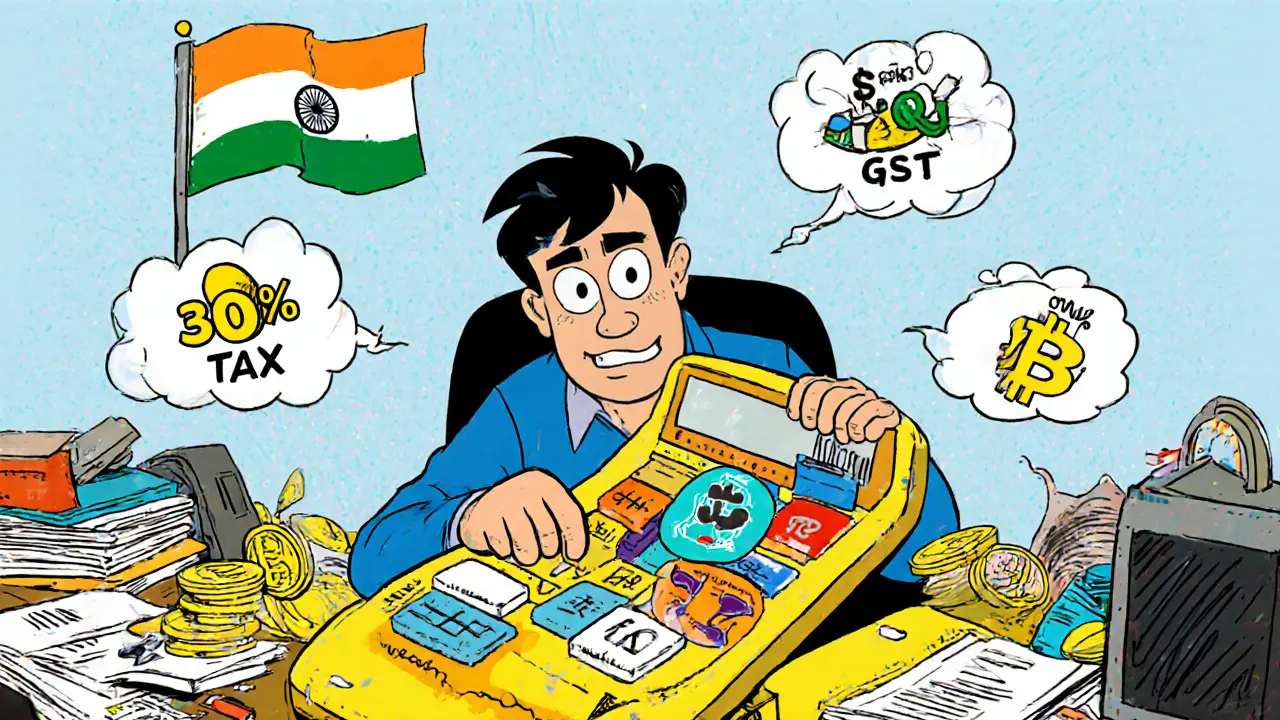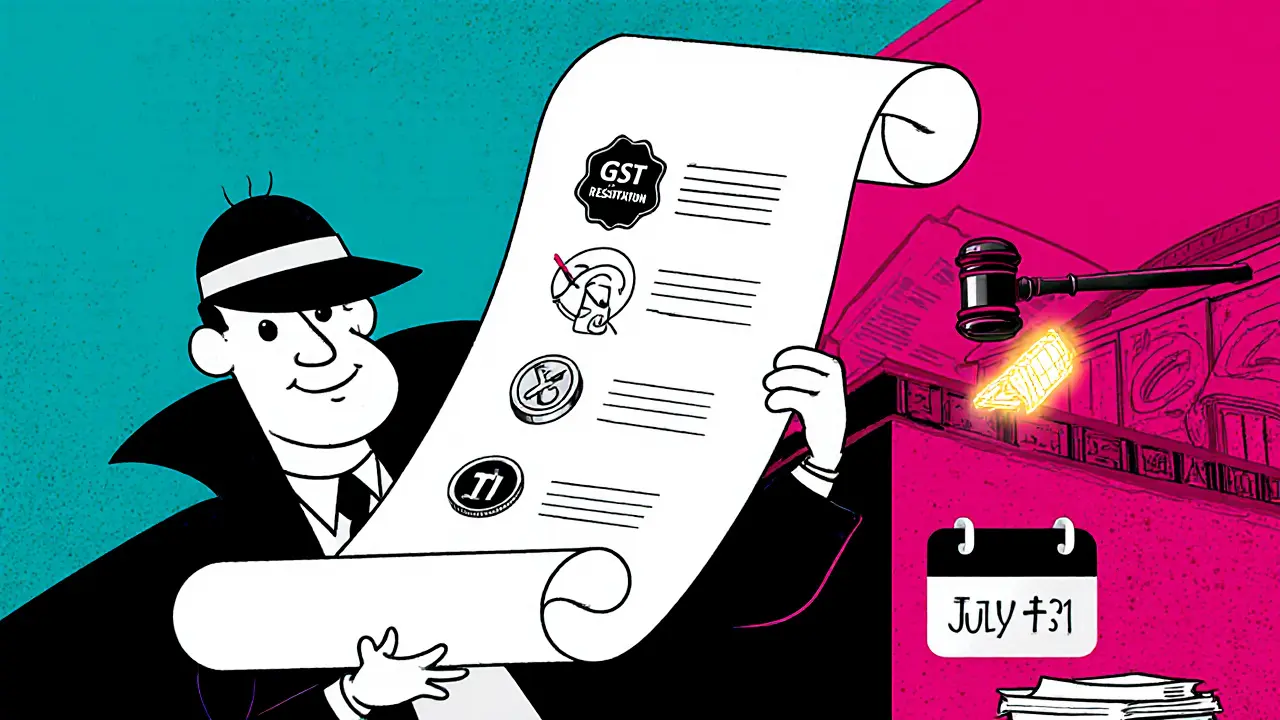
Crypto Tax Penalty Calculator
Enter values and click calculate to see potential penalties
Note on India's Crypto Tax Regime
India levies a flat 30% tax on crypto gains under Section 115BBH. TDS of 1% is required on sales under Section 194S. Platforms must charge 18% GST starting July 7, 2025. Penalties can reach up to 200% of tax due for non-compliance.
Key Takeaways
- India taxes all crypto gains at a flat 30% under Section115BBH, with no loss‑offset provision.
- A 1% Tax‑Deducted‑At‑Source (TDS) must be deducted on every sale under Section194S.
- From July72025, crypto platforms owe an 18% GST on all services offered to Indian users.
- Failure to comply can trigger penalties up to 200% of tax due, prosecution, and GST fines.
- CBDT is reviewing the regime, so rules may shift before the next fiscal year.
What India’s Crypto Tax Regime Looks Like
In 2022 the Finance Ministry introduced a dedicated tax line for cryptocurrency digital assets that can be transferred, stored, or traded electronically. The rule is codified in Section115BBH of the Income Tax Act and treats every transaction involving Virtual Digital Assets (VDAs) like lottery winnings - a flat 30% tax on the difference between sale price and cost price. No matter how long you held the asset, the rate stays the same, and you cannot offset crypto losses against other income or even against other crypto gains.
The government’s stance is intentionally deterrent. By matching the tax bite of gambling, officials aim to curb speculative inflows while still extracting revenue from the booming market.
Core Enforcement Mechanisms
Enforcement is built around three pillars: TDS, GST, and mandatory reporting.
1. 1% TDS on Every Sale (Section194S)
When you sell crypto to a buyer in India, the buyer must deduct 1% of the transaction value and remit it to the tax department. The deducted amount is reflected in the seller’s Form26AS as a credit. If the buyer fails to deduct TDS, the seller can still be held liable for the tax, and the buyer may face a penalty for non‑deduction.
2. 18% GST on Platform Services (Effective July72025)
All crypto exchanges and wallet providers are now classified as Online Information and Database Access or Retrieval (OIDAR) services. That forces them to register for GST regardless of turnover and to charge 18% on every fee - trading, staking, withdrawals, deposits, and even KYC services. The GST law treats these as “other services not elsewhere classified,” so the tax applies uniformly across the board.
3. Mandatory Reporting on ITR Forms
Individual taxpayers must disclose crypto income in either ITR‑2 (capital‑gain scenario) or ITR‑3 (business‑income scenario). Both forms contain a dedicated "Schedule VDA" where you list each transaction, the fair market value at the time of receipt, and the tax payable. Failure to file ScheduleVDA is treated as a willful omission under Section271 of the Income Tax Act, attracting steep penalties.

Penalties for Non‑Compliance
India uses the same penalty machinery for crypto as for other income‑tax violations, but the regime adds GST‑specific fines.
Tax‑Related Penalties
- Under‑reporting of income: Section271(1) imposes a penalty of 100% of the tax shortfall, up to a maximum of 200% of the tax due.
- Failure to deduct TDS (Section194S): The buyer can be penalized up to 200% of the TDS amount plus interest.
- Willful concealment (Section271A): Prosecution may lead to up to three years imprisonment and a fine up to the amount of tax evaded.
GST‑Related Penalties
- Non‑registration or late registration: A levy of 10% of the tax due, with a minimum of ₹10,000.
- Failure to issue GST invoice: A penalty of 10% of the tax amount per invoice, plus interest.
- Supply of services without GST: A compound penalty of 100% of the tax amount, plus possible prosecution under the CGST Act.
Penalty Comparison Table
| Violation | Statutory Penalty | Maximum Fine | Possible Imprisonment |
|---|---|---|---|
| Under‑reporting crypto gains (Section271) | 100% of tax shortfall | 200% of tax due | None (civil) |
| Failure to deduct 1% TDS (Section194S) | Penalty up to 200% of TDS amount | 200% of TDS | None (civil) |
| Willful concealment (Section271A) | Fine equal to tax evaded | Tax amount + 200% penalty | Up to 3years |
| Non‑GST registration (CGST Act) | 10% of tax due | ₹10,000 minimum | None |
| Failure to issue GST invoice | 10% of tax per invoice | Variable - depends on volume | None |
| Supply of services without GST | 100% of tax amount | Tax amount + interest | Possible prosecution under CGST |
Compliance Checklist for Traders and Platforms
- Register your exchange or wallet service for GST before July2025.
- Implement automatic 1% TDS deduction on every outbound transfer.
- Maintain detailed transaction logs (date, token, quantity, FMV, buyer/seller IDs) for at least five years.
- Issue GST‑compliant invoices for all fees and services.
- Report crypto income on ScheduleVDA of the appropriate ITR form before the July31 filing deadline.
- Reconcile Form26AS TDS credits with your own records to avoid mismatch notices.
- Stay updated on CBDT consultation papers - any amendment can change filing thresholds or penalty structures.
Recent Developments and Outlook
In August2025 the Central Board of Direct Taxes (CBDT) circulated a questionnaire to all crypto exchanges. The board asked whether the 1% TDS is “excessive” and whether the flat 30% rate has “eroded market liquidity.” The feedback loop signals that the current regime may be softened - perhaps introducing loss‑offset provisions or lowering the TDS rate.
Simultaneously, the Reserve Bank of India (RBI) continues to warn about macroeconomic risks, but it has also hinted at a state‑run digital currency that could coexist with private tokens. If a central digital rupee gains traction, the tax treatment could shift dramatically, possibly moving crypto into a regulated “digital assets” classification.
The Securities and Exchange Board of India (SEBI) has suggested a multi‑regulator model, meaning future compliance may require additional reporting to a securities watchdog, especially for tokenized securities.
For now, the safest bet is to treat crypto earnings as fully taxable, deduct the 1% TDS, collect GST, and keep immaculate records. Until a comprehensive crypto law replaces the patchwork of tax provisions, non‑compliance remains a high‑risk game.

Frequently Asked Questions
Do I need to pay GST if I only trade on foreign exchanges?
If you are an Indian resident using a foreign exchange, the platform itself is not an Indian OIDAR service, so GST does not apply to the exchange’s fees. However, any Indian‑based service you use (e.g., a local wallet or KYC provider) must charge GST on its own fees.
What happens if I forget to deduct the 1% TDS on a sale?
The buyer can be penalised up to 200% of the TDS amount, and the tax authority may raise a notice against both parties. The seller remains liable for the 30% tax on the gain, plus interest on the unpaid amount.
Can I claim a loss from one crypto transaction against a gain from another?
No. The Indian tax code disallows loss set‑off for crypto. Each gain is taxed individually at 30% with no netting against losses.
Are penalties for non‑filing of Schedule VDA the same as other missed disclosures?
Yes. Failure to file ScheduleVDA is treated as a willful omission under Section271, attracting a 100% penalty of the tax due, potentially rising to 200%.
Will the upcoming CBDT review change the 30% flat rate?
The CBDT has not announced a final decision, but the consultation indicates they are exploring a lower rate or a tiered structure. Until an official amendment is published, the 30% flat rate remains enforceable.

Sidharth Praveen
June 8, 2025 AT 21:39Stay on top of those crypto tax rules, it's the smartest move you can make right now.
Jan B.
June 11, 2025 AT 05:12The Section 271 penalty can indeed reach up to 200 % of the tax liability.
Stefano Benny
June 13, 2025 AT 12:46When you talk about “non‑compliance” you’re really diving into the dark side of DeFi, where every missed TDS slice could cost you extra gas and a hefty 271A slap 😅. The crypto‑tax ecosystem is basically a layered protocol of penalties, each with its own opcode.
John Kinh
June 15, 2025 AT 20:19Ugh, another tax nightmare 🙄.
Mark Camden
June 18, 2025 AT 03:52From a legal standpoint, the Indian tax authority is exercising its sovereign right to enforce fiscal compliance. The statutory provisions under Sections 271, 271A, and 194S are crystal‑clear, and wilful concealment is not a victimless act. Ignorance will not exculpate a trader, and the punitive multiplier of up to 200 % reflects the gravity of the offense.
Evie View
June 20, 2025 AT 11:26Look, the government is basically hunting us like crypto‑hunting dogs, and if you slip up you get smacked with a penalty that feels like a double‑whammy. It’s not just about the tax; it’s about the power play. They want to make an example, and they’ll use every legal lever to do it. You think a 1 % TDS is tiny? In reality it’s a gateway to a cascade of fines that can wipe out your portfolio. I’m done pretending it’s “just a formality.”
Sophie Sturdevant
June 22, 2025 AT 18:59Pro tip: keep meticulous ledgers for every trade and the associated GST invoice. If you automate the 1 % TDS deduction at source, you avoid the Section 194S nightmare. Remember, the tax slab is flat 30 % plus GST, so there’s no room for clever accounting tricks.
Nathan Blades
June 25, 2025 AT 02:32🔥🚀 Let’s turn this compliance headache into a power‑up! By treating the penalty calculator as a game, you can pre‑empt costly mistakes. Plot your transactions, run the simulation, and lock in the right deductions before the tax man knocks. Every smart trader knows that foresight saves both money and sleepless nights.
Somesh Nikam
June 27, 2025 AT 10:06Hey fellow Indian trader 😊, just a reminder to file your GST registration early. It’s a tiny step that saves you huge headaches later. Keep those invoices clean and the tax office will be less likely to chase you down.
MARLIN RIVERA
June 29, 2025 AT 17:39The punitive framework is statistically designed to maximize revenue extraction, not to foster a fair trading environment.
Debby Haime
July 2, 2025 AT 01:12Balancing the books can feel overwhelming, but breaking down each transaction into taxable and non‑taxable components really helps. Use a spreadsheet, color‑code gains versus losses, and you’ll see the picture clearer.
emmanuel omari
July 4, 2025 AT 08:46India should focus on building blockchain infrastructure instead of micro‑penalizing traders. Our nation has the talent, why punish the innovators?
Andy Cox
July 6, 2025 AT 16:19Just taking it easy – the tax thing is a grind, but it’s just another part of the crypto journey.
Courtney Winq-Microblading
July 8, 2025 AT 23:52When we contemplate the philosophical underpinnings of fiscal policy, we realize that taxation is a social contract – a dialogue between the individual and the collective. Yet the imposition of a 200 % penalty feels less like dialogue and more like a monologue from an authoritarian state. In that light, one might argue that compliance becomes an act of surrender rather than a cooperative endeavor. Still, navigating the practicalities requires us to harness both reason and intuition, marrying the rigor of accounting with the fluidity of the market.
katie littlewood
July 11, 2025 AT 07:26First, understand that the Indian tax code treats crypto assets as a distinct class, subjecting them to a flat 30 % rate irrespective of your overall income bracket, which is unlike most jurisdictions that tier rates. Second, the mandatory 1 % TDS on each sale means that the tax liability is partially collected at source, reducing the amount you’ll owe at year‑end but also creating a cash‑flow consideration for active traders. Third, the GST regime, which will be enforced from July 2025, imposes an 18 % charge on the service fee of exchanges, and failure to register can attract penalties under the CGST Act. Fourth, under‑reporting gains triggers Section 271, where the penalty can be up to 200 % of the tax due, effectively doubling your financial burden. Fifth, willful concealment under Section 271A carries an even harsher punitive multiplier, reflecting the government’s zero‑tolerance stance on deliberate evasion. Sixth, non‑deduction of the 1 % TDS is itself a separate violation, invoking Section 194S penalties that compound the overall cost. Seventh, the tax department now cross‑references exchange KYC data with declared income, making under‑reporting increasingly risky. Eighth, many traders overlook the need to retain transaction‑level evidence, which is crucial for substantiating the cost‑basis and calculating capital gains accurately. Ninth, the penalty calculator you’re looking at is a valuable tool; running hypothetical scenarios helps you pre‑empt costly errors. Tenth, while the compliance landscape seems daunting, employing a dedicated crypto‑tax service can automate much of the reporting, ensuring you stay within the legal framework. Eleventh, remember that the spirit of these regulations is to bring transparency to a market that was previously opaque. Twelfth, the penalties, though steep, are designed to deter systemic abuse and protect the tax base. Thirteenth, if you’re an Indian resident, you must also disclose crypto holdings in your annual financial statements if they exceed a certain threshold. Fourteenth, planning ahead-especially before the GST rollout-will save you both time and money. Fifteenth, ultimately, staying informed and proactive is the best defense against unexpected penalties.
Jenae Lawler
July 13, 2025 AT 14:59It is incumbent upon the fiscally responsible citizen to internalize the gravitas of statutory compliance, lest one be ensnared by the labyrinthine provisions of Sections 271, 271A, and 194S.
Chad Fraser
July 15, 2025 AT 22:32Yo, don’t let the tax stuff kill your vibe-just plug the numbers into the calculator and keep the hustle going.
Jayne McCann
July 18, 2025 AT 06:06Honestly, the whole penalty thing feels overblown.
Richard Herman
July 20, 2025 AT 13:39Let’s keep the conversation constructive and help each other avoid costly mistakes.
Parker Dixon
July 22, 2025 AT 21:12For anyone struggling with the calculations, I recommend using a crypto‑tax SaaS that integrates directly with your exchange APIs; it automates TDS, GST, and capital gains reporting.
Bobby Ferew
July 25, 2025 AT 04:46It’s frustrating how the tax man seems to target crypto users specifically-makes me feel singled out.